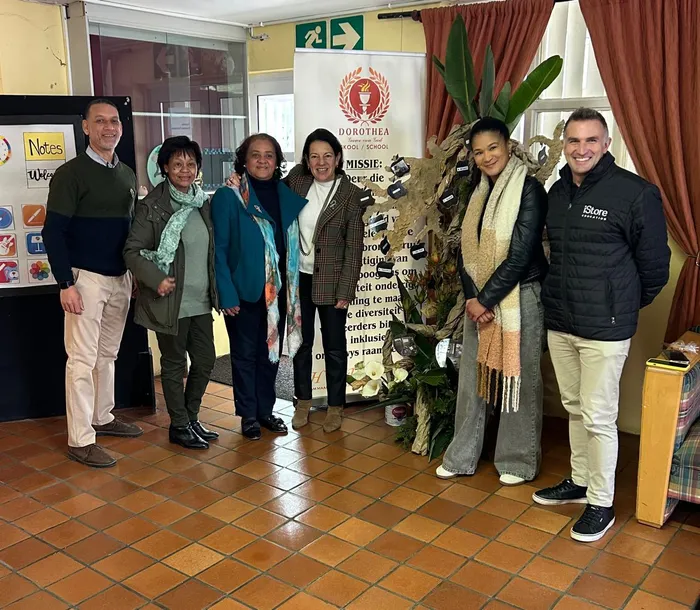Transforming special needs education: The impact of digital learning at Dorothea School

iSchoolAfrica Education Trust’s disability inclusion programme at Dorothea School in Stellenbosch is advancing inclusivity in classroom. From left: Wendyll Wilson (technical officer), Helene Vermeulen (Dorothea School's deputy principal), Anthea Williams (principal), Michelle Lissoos - (iSchoolAfrica director), Jasmin Meyer (teacher and iPad champion) and Gavin McKinney (technical lead).
Image: Supplied
Parents of children with disabilities have seen a significant shift in children's learning and behaviour thanks to the iPad learning programme at Dorothea School for Learners with Special Educational Needs (LSEN) in Stellenbosch.
The learning programme forms part of the iSchoolAfrica Education Trust’s disability inclusion programme at Dorothea School, which promotes inclusivity in the classroom.
Ashric Don said his son, who has been a pupil at the school since 2019, has become more engaged in classroom activities since joining the programme.
“He genuinely looks forward to attending school every day, largely because of the iPad programmes, especially those that involve music, which he absolutely loves.
“We have noticed a significant shift in his learning and behaviour. He is more engaged, especially in the activities he enjoys,” Mr Don said.
iSchoolAfrica’s iPad learning programme is active in 36 special needs schools across South Africa.
Zulaikha Goolam, iSchool Africa programme manager, said the partnership between the school and the trust has been made possible by corporate sponsorship.
Since receiving Apple distinguished school status in 2023, Dorothea School’s teachers have been equipped with the necessary technical skills and digital tools to enhance their pupils’ ability to learn and interact.
The programme has helped teachers integrate the iPad technology into their curriculum.
Anthea Williams, principal of Dorothea School for learners with special educational needs (LSEN), said pupils at the school have a diverse range of abilities and support needs.
“Disabled learners are often marginalised in their communities and limited in their access to education. Even though all our learners come from challenging backgrounds, they now have access to the world’s best technology.
The iPad's built-in accessibility features and curated apps have also helped pupils connect, communicate, and engage in ways that traditional classroom methods could not.
Teacher Jasmin Meyer highlighted the impact of the learning programme on the school's autistic pupils.
“We have a learner with autism who was able to draw exactly what she was imagining and add narratives to this. She used Keynote for illustrations and stories. We were amazed at her creativity and talent,” Ms Meyer said.
Ms Meyer added that without the technology, the young girl's abilities were never identified, and now she is recognised.
Since the introduction of the programme at Dorothea School, pupils are also interacting with digital stories, which have paved the way for parents of non-verbal autistic children to hear their voices for the first time.
Elin Swanepoel, a speech therapist at the school, said parents are now able to see their children complete tasks that they never before imagined.
"Parents can witness their non-verbal children tell them that they love them for the first time,” Ms Swanepoel said, adding: “No disability is too disabling for our learners with an iPad."
Ms Williams added that with support from iSchoolAfrica, Dorothea School has gained access to a wealth of resources and professional development opportunities.
“The challenge of striving for something that may always be just out of our reach is what led us to achieve far more than we could have imagined,” Ms Williams added.